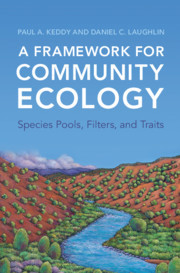Description
A Framework for Community Ecology
Species Pools, Filters and Traits
Authors: Keddy Paul A., Laughlin Daniel C.
Language: English
Subject for A Framework for Community Ecology:
Approximative price 99.36 €
In Print (Delivery period: 14 days).
Add to cart
Publication date: 12-2021
368 p. · 15.7x23.5 cm · Hardback
368 p. · 15.7x23.5 cm · Hardback
Description
/li>Contents
/li>Biography
/li>
This book addresses an important problem in ecology: how are communities assembled from species pools? This pressing question underlies a broad array of practical problems in ecology and environmental science, including restoration of damaged landscapes, management of protected areas, and protection of threatened species. This book presents a simple logical structure for ecological assembly and addresses key areas including species pools, traits, environmental filters, and functional groups. It demonstrates the use of two predictive models (CATS and Traitspace) and consists of many wide-ranging examples including plants in deserts, wetlands, and forests, and communities of fish, amphibians, birds, mammals, and fungi. Global in scope, this volume ranges from the arid lands of North Africa, to forests in the Himalayas, to Amazonian floodplains. There is a strong focus on applications, particularly the twin challenges of conserving biodiversity and understanding community responses to climate change.
Preface; 1. A general framework for community ecology; 2. Filters; 3. Species pools; 4. Traits; 5. Trait-environment interactions; 6. Functional groups; 7. Predictive models of community assembly; 8. Prospects and possibilities; References; Index.
Paul A. Keddy is an independent researcher who has taught community ecology for more than 30 years. Paul conducted award-winning research on environmental factors controlling plant communities and their manipulation to enhance native biodiversity. He delights in bringing science alive for his audience. Author of six books winning three scientific prizes, he also co-edited Ecological Assembly Rules: Perspectives, Advances and Retreats (Cambridge University Press, 1999).
Daniel C. Laughlin is an Associate Professor of plant ecology and ecological modelling in the Department of Botany at the University of Wyoming. Daniel's research focuses on developing quantitative approaches to understand and predict how plant species and communities respond to global change. His lab develops trait-based models that translate ecological processes into statistical frameworks to predict how communities assemble along environmental gradients and how species interact at local scales.
Daniel C. Laughlin is an Associate Professor of plant ecology and ecological modelling in the Department of Botany at the University of Wyoming. Daniel's research focuses on developing quantitative approaches to understand and predict how plant species and communities respond to global change. His lab develops trait-based models that translate ecological processes into statistical frameworks to predict how communities assemble along environmental gradients and how species interact at local scales.
© 2024 LAVOISIER S.A.S.




